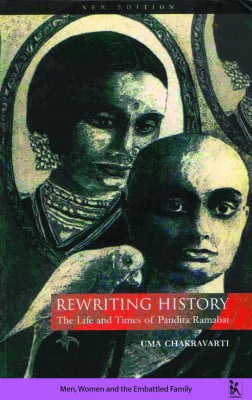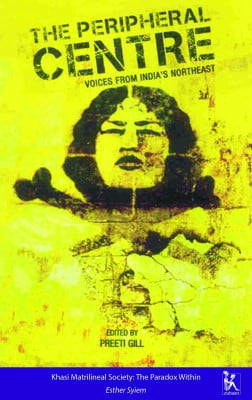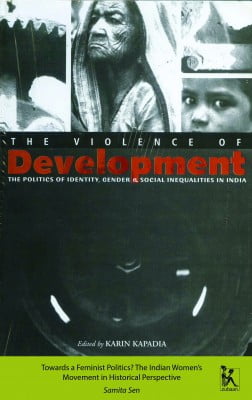No products in the cart.
Return To ShopOur e-Essays project is now LIVE! Previously-released essays are available here, and each month a new essay is available for free with any other purchase.
To be added to the mailing list, subscribe here!
We opened our offering of the e-Essays with a focus on Indian women’s movements. Our second lot of essays looked at sexual violence. The third set of our e-Essays has been curated to the theme of domestic space and kinship. Covering a breadth of disciplines and spatiotemporal positions, this set comments on familial (matriarchal/patriarchal) and architectural structures as building blocks of women’s lived experiences. A historical exploration of matrilineal Khasi societies and a piece on the changing role of women’s education in 19th century Maharashtra connect here with an essay on women-only homes as seen in Indo-English women’s writings, the three together examining the nature of power as it is employed within the family home.
1) ‘Men, Women and the Embattled Family’ by Uma Chakravarti from Rewriting History: The Life and Times of Pandita Ramabai, 1998.
 Uma Chakravarti’s essay delves into the discourses of women’s changing roles in nineteenth century Maharashtra, particularly in relation to education. As the household became enmeshed in a web of debates that had seeped in from the public to the domestic sphere, the education of one’s wife was a project taken on by many male Hindu middle-class reformers. This essay explores not only the nature of the education that was imparted – which was fundamentally different from that given to men – but also its perceived functions and the consequences faced by women who were given access to such ‘schooling’. 46 pp.
Uma Chakravarti’s essay delves into the discourses of women’s changing roles in nineteenth century Maharashtra, particularly in relation to education. As the household became enmeshed in a web of debates that had seeped in from the public to the domestic sphere, the education of one’s wife was a project taken on by many male Hindu middle-class reformers. This essay explores not only the nature of the education that was imparted – which was fundamentally different from that given to men – but also its perceived functions and the consequences faced by women who were given access to such ‘schooling’. 46 pp.
₹70.00
Dr. Uma Chakravarti is a feminist historian who taught at Miranda House, Delhi University. She writes on Buddhism, early Indian history, the 19th century and on contemporary issues.
2) ‘Women-Only Homes’ by Geetanjali Singh Chanda from Indian Women in the House of Fiction, 2008.
 Colonization dramatically altered the understanding of Indianness in light of nationalism and womanhood in light of modernism. Geetanjali Singh Chanda argues effectively in Indian Women in the House of Fiction that the home is the nexus of the construction of Indianness and womanhood because of this Indo-English encounter.Chanda traces the evolution of homes and domestic ideologies from the joint-family, indigenous patriarchal haveli dwelling to the Western import, the bungalow, to the urban apartment by analyzing texts of Indo-English women’s writings. 46 pp.
Colonization dramatically altered the understanding of Indianness in light of nationalism and womanhood in light of modernism. Geetanjali Singh Chanda argues effectively in Indian Women in the House of Fiction that the home is the nexus of the construction of Indianness and womanhood because of this Indo-English encounter.Chanda traces the evolution of homes and domestic ideologies from the joint-family, indigenous patriarchal haveli dwelling to the Western import, the bungalow, to the urban apartment by analyzing texts of Indo-English women’s writings. 46 pp.Read more.
₹70.00
Dr. Geetanjali Singh Chanda is a senior lecturer in the Women’s, Gender, and Sexuality Studies Programme at Yale University, USA. She has taught courses on globalization, autobiographies, family, cultural identity, popular culture, international feminisms and postcolonial India since 2001. Her research interests include religion, masculinities and popular culture.
3) ‘Khasi Matrilineal Society: The Paradox Within’ by Esther Syiem from The Peripheral Centre: Voices from India’s Northeast, 2010.
 Esther Syiem’s essay traces the paradoxical nature of women’s status in Khasi matrilineal society. At once empowered and oppressed, Khasi women learn to negotiate these contradictions in their day-to-day engagements with society.
Esther Syiem’s essay traces the paradoxical nature of women’s status in Khasi matrilineal society. At once empowered and oppressed, Khasi women learn to negotiate these contradictions in their day-to-day engagements with society.
Despite being both visible and vocal, like their sisters across the country Khasi women too face a skewed sex ratio, a lack of reproductive choices, widespread domestic violence and a host of other issues. 9pp.
Read more.
₹50.00
Esther Syiem teaches English Literature at North-Eastern Hill University, Shillong, and specializes in American Literature, Modern Fiction and Folk Literature. Her publications are in both English and Khasi, and they include poetry collections like Oral Scriptings (2005) and Of Follies and Frailties of Wit and Wisdom (2010).
Free in July, with the purchase of any other essay:
4) ‘Towards a Feminist Politics: The Indian Women’s Movement in Historical Perspective’ by Samita Sen from The Violence of Development: The Politics of Identity, Gender
& Social Inequalities in India, 2002.
& Social Inequalities in India, 2002.
 Samita Sen’s essay traces the history of the Indian women’s movement from the 1920s to the present day. The chronological as well as thematic logic of the essay follows three primary heads: a historical background, the Uniform Civil Code (UCC) controversy, and the political implications of the reservation for women in legislatures.
Samita Sen’s essay traces the history of the Indian women’s movement from the 1920s to the present day. The chronological as well as thematic logic of the essay follows three primary heads: a historical background, the Uniform Civil Code (UCC) controversy, and the political implications of the reservation for women in legislatures.
For Sen, a new feminist politics has to address struggles of class, caste, community, religion et al, without displacing gender as the central concern, making this essay one of crucial importance for understanding the origins of the issues facing feminist politics today. 53pp.
₹70.00
Samita Sen is Director, School of Women’s Studies, and Dean, Faculty of Interdisciplinary Studies, Law and Management, Jadavpur University. She writes on education, the women’s movement, marriage, domestic violence, women in governance and women’s land rights.
A note on pricing, frequency and format:
Ten new essays are released each month, and subscribers receive each new set in their inbox three times a month. The essays range from just a few pages to 100-page chapters, and we have therefore created three pricing tiers: 50, 70 and 95 rupees. Responses to our test survey in March indicated that a majority of readers would be willing to pay up to Rs. 100, so we’ve kept even the longest essay under that amount. The vast majority of our readers also included PDFs in their preference of format, and we have therefore standardised all our essays in PDF files.
If you’re interested to see what’s coming next, make sure you’ve joined our emailing list, and keep your eye out for the next mailer/blog post.
Happy Reading!

